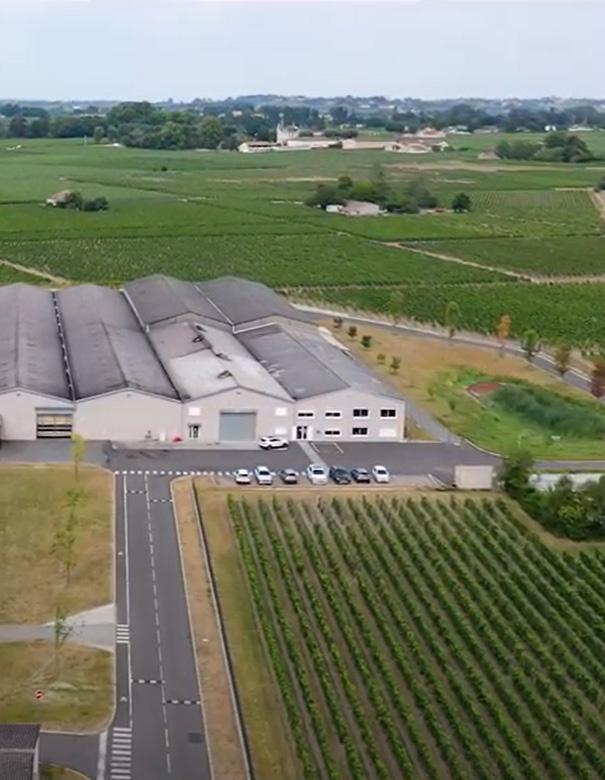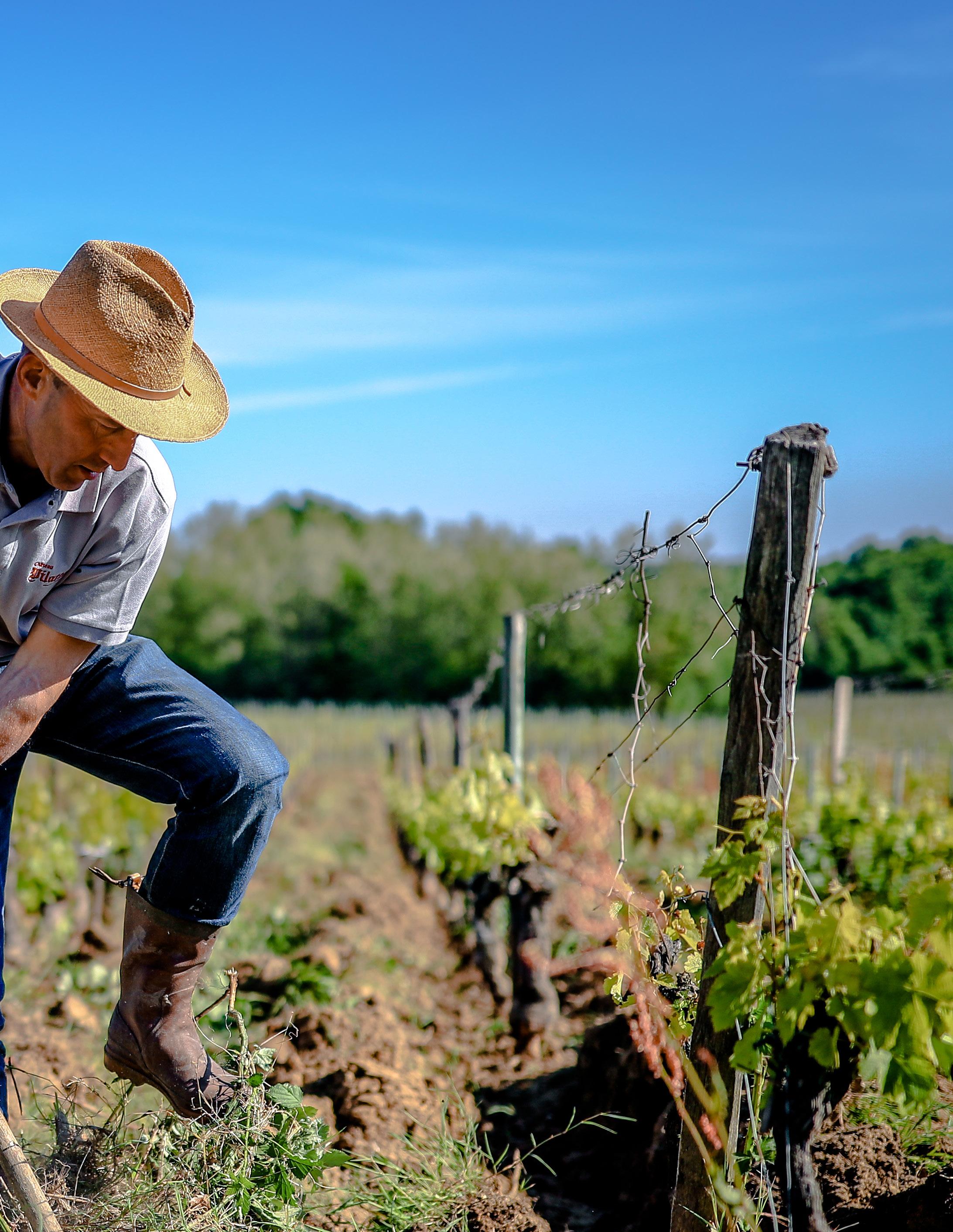
9 minute read
JULES LEBÈGUE
from Earth Day Heroes
by gregoryvine
AOC Saint-Émilion
Founded in 1828 in the Médoc, the Jules Lebègue trading firm started with a flourishing export business that shipped Bordeaux wines throughout the British Empire, earning a prestige reputation that extends to the present. In 2006, Jules Lebègue was acquired by AdVini, a global wine leader that sources fine wines in France and South Africa. Under the leadership of Managing Director Alban de Belloy, the firm took a radical turn towards sustainable development in 2019.

ALBAN DE BELLOY
Manager Director

As a négociant, Jules Lebègue is in a unique position to positively influence sustainable initiatives on multiple fronts, from their core business of sourcing wines from top growers to every aspect of blending, marketing, bottling and distribution. The firm encourages all their partner winegrowers to adopt environmentally-friendly practices and provides direct assistance to obtain HVE3 and organic certification. Jules Lebègue favors certified organic, biodynamic and bee-friendly wines that are made without pesticide residues and CMR. Eco-design also factors heavily into the company’s sustainable mission. All packaging materials such as lighter bottles with recyclable caps meet strict criteria for minimal environmental impact, as do bottling lines and distribution channels. And, every aspect is monitored by a Product Life Cycle Analysis process that measures the company’s impact by multiple criteria, notably carbon impact, water usage, waste management and energy consumption.
Jules Lebègue Saint-Émilion Bio 2019


Sustainability is our raison d’être Bordeaux Leads the Way
Project leader Alban de Belloy shares that in just a few years “sustainable development has become the raison d’être of the Jules Lebègue company; it guides us in our choices, our development and our strategy.” The results are good for business on every level. Jules Lebègue recorded an 100% growth in sales of organic wines in 2020. Even more favorably, employee engagement in sustainable projects is extremely high, providing a source of meaning that extends from eco-actions such as planting community vegetable gardens and meeting daily recycling goals to minimizing waste at every phase of production. The company is proud of their collective efforts to reduce carbon impact through everyday choices. When employees get involved, meaningful change happens; Jules Lebègue consumes 40% less water and 3X less electricity and gas resources than their peers in Bordeaux. Jules Lebègue is also working to drive awareness throughout the supply chain, by encouraging distributors to respond to heightened consumer demand for environmentally-conscious action. Changing long-established behavior is always challenging, but De Belloy finds that that his arguments are resonating more than ever and wants to get the word out: “Bordeaux wines are already well advanced in terms of environmental protection. It is up to us to let people know!”
De Belloy underscores that organic practices are the right thing to do on just about every level, from greater employee and customer satisfaction to new commercial opportunity and product quality. “Our increased focus on organic wines has pushed us to be more demanding and selective, and the quality has never been higher,” de Belloy notes. 2020 was a banner year for Jules Lebègue wines as evidenced by critical acclaim and medals. Perhaps most noteworthy: a 95-point score from Decanter Magazine for 2019 Jules Lebègue Saint Emilion Bio, a 100% organic wine that exemplifies their environmental mission.

EARTH DAY HEROES
AT A GLANCE
CHÂTEAU GUIRAUD (SAUTERNES) — Pioneers in Permaculture
Château Guiraud is Bordeaux’s first Grand Cru Classé to attain organic certification in 2011. Planty and his team are committed to permaculture, a form of agriculture that involves total integration of climate, soil type, topography, water usage, rainfall and human activity. Grass covers and plants such as chamomile, comfrey, nettles, lovage, hyssop and horsetail attract more than 700 species of pollinators to the vineyard. Planty estimates that around 1 million different types of bacteria, 100,000 fungal varieties and 1,000 invertebrate species are hard at work in the soils; over time, it all gives back in the form of healthier vines.
CHÂTEAU JEAN FAURE (SAINT-ÉMILION) — Healthy Vines and Soils
Château Jean Faure is an historic Saint-Émilion wine estate that attained official organic farming certification in 2017 and biodynamic certification in 2020. MarieLaure finds that wine lovers are increasingly demanding ethically made products, creating real commercial opportunity for certified wines. Ultimately, the wine itself makes the strongest case for organic and biodynamic practices. Marie-Laure credits responsible agriculture for the freshness of the estate fruit and the removal of added sulfur from most vinifications for greater purity of the aromas.
CHÂTEAU BROWN (PESSAC-LÉOGNAN) — A Flower Farm and Fruit Trees
Led by fifth-generation winemaker Jean-Christophe and technical director Bruno Patrouilleau, Château Brown in Pessac-Léognan commits to biodiversity in every aspect of vineyard management. Only 55% of the estate is planted to vines; planted trees and hedges, an apiary, and, most recently, an orchard and flower farm form the ecosystem of the estate. The orchard includes 36 fruit trees (apple, cherry, pear and plum) and is a refuge for biodiversity: it attract bees, insects and birds, and acts as natural carbon trap. The flower farm is a collaboration with a local grower to produce seasonal French blooms.
CHÂTEAU ROQUEFORT (ENTRE-DEUX-MERS) — A Forest Through the Trees
Owners since 1976, the Bellanger family’s approach to sustainability has been finding the balance between cultivated vines and natural growth, with a large portion of the estate dedicated to forests. More than 25% of the estate’s surface area is preserved for the forest, versus 45% for the vineyard (the remaining 30% encompasses the historic building). Frédéric and Anne Bellanger consider Château Roquefort a living legacy to pass on to their four daughter and firmly believe that, “We must respect what the earth has given us.”
VIGNOBLES ROUSSEAU — Giant Bamboo at Work
Family-owned since 1830, Vignobles Rousseau family has always valued a commitment to sustainable agriculture and advancing human equity. 1998, the completion of the A89 motorway introduced significant emissions to the landscape. In order to protect their ecosystem, Laurent and his team have planted nearly 13,000 square feet of giant bamboo hedges to act as a protective, natural barrier to potentially harmful elements. Minimally invasive to the soil, bamboo requires limited water resources and is cut and crushed every year for mulch.
GRANDS CHAIS — Global Reach Means Global Impact
Founded in 1979 in Alsace by Famille Helfrich, Grands Chais de France (GCF) is the largest exporter of French wines worldwide, representing more than 20% of French wine exports to 177 countries. GCF’s global reach allows the company to significantly impact the well-being of their consumers through the reduction of harmful additives and other environmental best practices. GCF has attained numerous certifications for their products (including HVE, BIO, Committed Winegrowers, ISO14000 and Energy Management ISO50001) through a decisive environmental commitment to reduce consumption of scarce natural resources.
LE GDON – Walking the Vines
Le GDON (the Group for the Defense against Harmful Organisms of the Vine) is a regional organization committed to the control of flavescence dorée, a catastrophic vine disease spread by the leafhopper insect. Director Sophie Bentéjac is one of four full-time employees of le GDON charged with mobilizing teams of full-time and seasonal employees to walk the vineyards and monitor for early detection, a prophylactic measure that drastically reduces the need for harmful pesticides. In 2019, 108 vineyard monitors from le GDON teamed up to cover an astounding 19,539 miles – a distance practically equivalent to the earth’s circumference!
CHÂTEAU BRILLETTE (MÉDOC) — Bio Packaging + Conservation
Château Brillette believes in working with their natural environment by modifying it as little as possible through minimal impact. With a 20% reduction in energy consumption costs over the past 2 years, Brillette credits the savings to changing habits and practices companywide – such as using less gas, water and electricity – and asks the same of suppliers. Barrels are delivered free of plastic wrappings and boxes (saving 1.5 containers of waste), a best practice which has inspired many followers in the Gironde. In September 2020, the winery team released their first all-vegan wine: 2018 Brin de Brillette is an eco-driven cuvée that represents the culmination of biodiversity in action.

BORDEAUX FAMILIES — The “Bee GIEE’s” in the Vineyard
Bordeaux Families is a leading cooperative of growers comprised of 300 members and spanning 12,355 acres in Sauveterre-Blasimon-Espiet. More than 10% of the group holdings are planted organically, and the goal is to increase to 20% organic production within 5 years. Since 2019, Bordeaux Families has been overseeing a collective of 13 farms as a Group of Economic and Environmental Interest (GIEE). The participating winegrowers affectionately refer to themselves as “Les Bee GIEE’s,” and aspire to complete integration between farming and their natural environment. As the name implies, the honeybee is a central protagonist in their ambitious “Bee Plan.”
JULES LEBÈGUE — Sustainability as the Raison d’Être
Under the leadership of Managing Director Alban de Belloy, the firm took a radical turn towards sustainable development in 2019. As a négociant, Jules Lebègue is in a unique position to positively influence sustainable initiatives, from their core business of sourcing wines from top growers to every aspect of blending, marketing, bottling and distribution. The firm favors certified organic, biodynamic and bee-friendly wines that are made without pesticide residues and CMR and encourages all their partner winegrowers to adopt environmentally friendly practices and provides direct assistance to obtain HVE3 and organic certification.
About
BORDEAUX WINE COUNCIL (C.I.V.B)
Bordeaux Wine Council (C.I.V.B.) was created by the French Law dated August 18, 1948. It unites representatives from the three families in the Bordeaux wine industry: winegrowers, merchants and traders.
The CIVB’s 4 missions:
• Marketing mission: stimulate demand for Bordeaux wines, recruit new, younger consumers and ensure their loyalty to the brand.
Provide education for the trade and strengthen relationships. • Technical mission: build knowledge, protect the quality of
Bordeaux wines and anticipate new requirements related to environmental, CSR and food safety regulations. • Economic mission: provide intelligence on production, the market, the environment and sale of Bordeaux wines around the world. • The industry’s general interests: protect the terroirs, fight counterfeiting, develop wine tourism.

To request samples or more information, please contact our press relations team.
MEDIA CONTACT – US Helen Gregory (helen@gregoryvine.com) Emma Mrkonic (emma@gregoryvine.com)
MEDIA CONTACT CIVB – INTERNATIONAL Cécile Ha (cecile.ha@vins-bordeaux.fr)










